萬盛學電腦網 >> 圖文處理 >> 平面設計理論 >> 白板手繪圖文知識解答:好點子從哪裡來?
白板手繪圖文知識解答:好點子從哪裡來?
過去五年,我一直在思考「好點子從哪裡來?」這個問題。
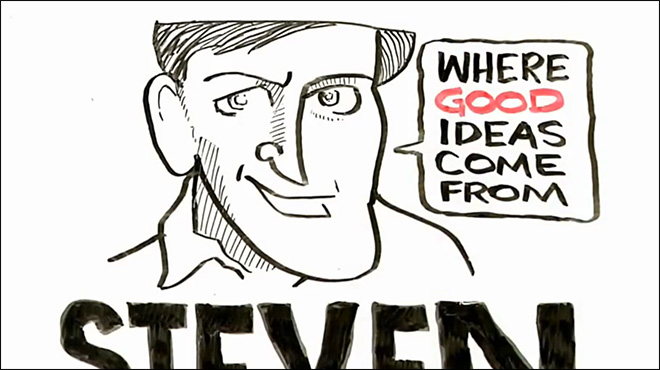
這是我們大家本質上都很感興趣的話題。我們想變得更有創意,我們要想出更好的點子,我們希望團隊更進步。
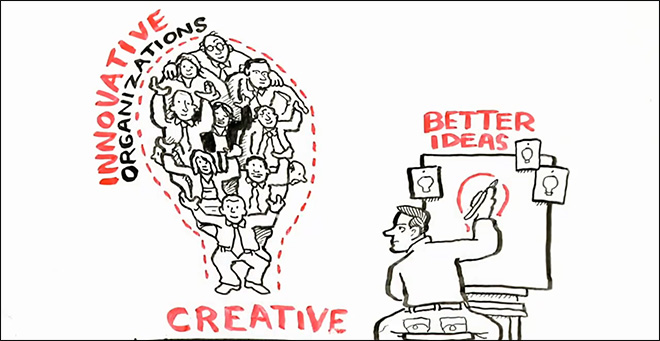
我試著從客觀環境這一角度來看這問題。什麼樣的環境可以導致歷史上非比尋常的創造力和創新速度?我從中發現的是,正是一些工作模式的不斷積累與重復,造就了一個創意倍出的環境。
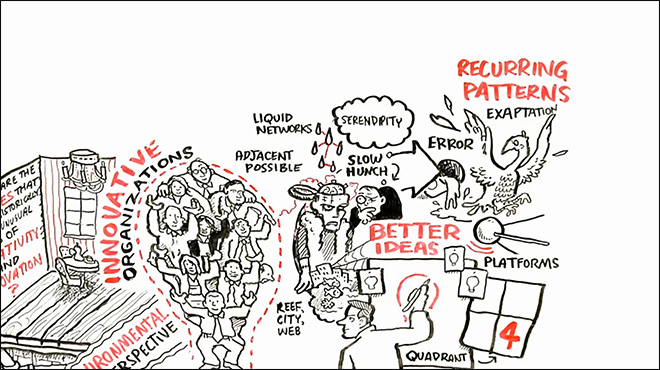
其中,有一種我稱之為「慢速預感」的模式—— 突破性的點子幾乎從不出自於瞬間的優異洞察力、神來一筆的靈感。大多數重要的點子要花很長的時間去演進 ,而且它們得花很長的時間潛伏在幕後。這些點子必須經歷兩三年,甚至是十或二十年才會成熟,然後突然地,它會在某方面對你變得非常有用,幫助你成功。
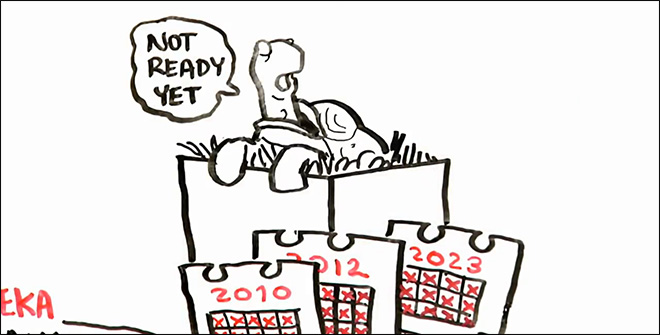
而這某種程度上是因為,好點子通常來自於小直覺之間的互相碰撞,然後它才能形成比本身要大得多的東西。所以,在創新的歷史當中,你會見到很多只有半個點子的狀況。

有個關於“全球資訊網”和 Tim Berners-Lee(全球資訊網的創始人)的好例子。這是個 Berners-Lee 致力了十年的故事。但當他剛開始的時候,他對於自己即將發明的新媒體並沒預見到全貌。開始時,他只是在做一個附帶的計劃去幫忙整理自己的資料。幾年之後他放棄了那計劃,然後開始做別的東西。而僅在大約十年之後,全球資訊網的完整願景便誕生了。
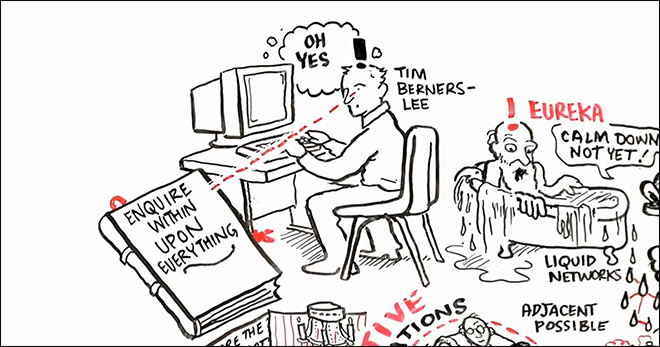
這就是多半點子如何產生的過程。它們需要時間去醞釀,並且在之後的很長一段時間裡,它們都處於這種不完整的預感形態。

當你如此思考點子時,還有一件重要的事,就是當點子發展成這預感階段時,他們需要和其他預感互相碰撞。 很多時候,將預感轉化成真正的突破性進展的東西,是潛伏在其他人心裡的預感。而你必須要找出適合自己的一套方法,讓那些預感聚集,並變得比那些零碎想法的總和還要更強大。

舉例來說,為什麼在啟蒙時期,從咖啡店或是巴黎的現代沙龍可以誕生強大的創造力?因為它們提供了一個場所,讓點子能夠交流、交換並產生新的形式。
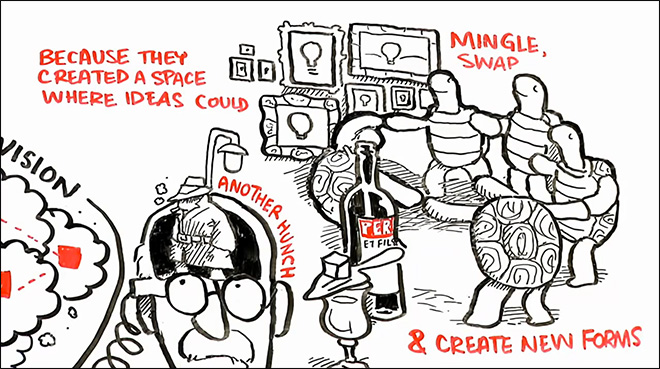
當你從這個角度來思考創新這個難題,就能清楚地解釋我們最近一直都有的爭論——網絡對我們的大腦做了些什麼?

我們是否因為生在互聯時代,被迫卷入這種多任務的生活方式而不知所措?假如當我們離開了那種較慢、較有深度、深思熟慮的閱讀狀態,是否將會導致較不周密的思維?
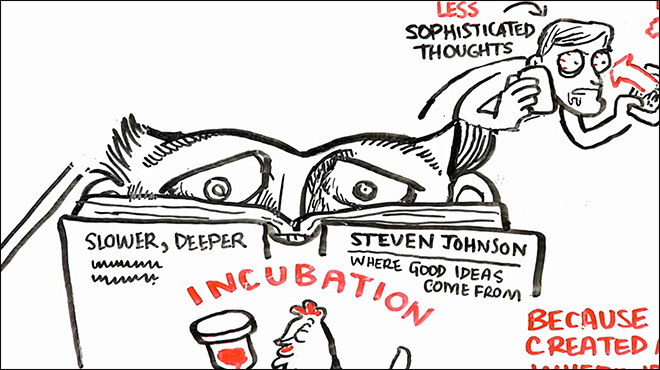
很明顯,我熱愛閱讀。但同時我們不能忘記,科學創新和科技進步,其背後的偉大推手一直以來都是:
一、歷史上人類之間越來越密切的聯系;
二、我們向外發展以及與他人交換想法的能力;
三、借助他人預感並結合到自己預感之中,將其化作新事物的能力也很重要。
過去六、七百年在創造力和創新上的重大突破,很大程度上都歸功於以上幾點。

所以,我們的確更為分心了。但過去十五年中,我們也見證了許多非常神奇又不可思議的事情發生。我們有這麼多新的方式可以聯系在一起,這麼多方法使自己向外全面發展,並尋找到其他人,而這些人擁有我們所缺失的,能夠圓滿我們正在努力的點子。或者,我們還會僥幸碰到一些驚人的新信息可以用來構建、改進我們自身的點子。

這是我從「好點子從哪裡來?」的思考中學到的東西。機遇偏愛那些相互聯系、交換想法的人。
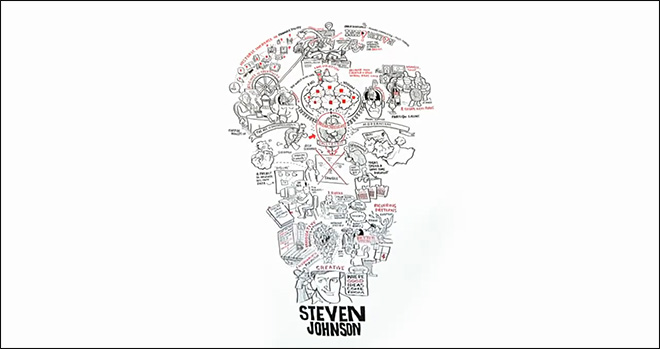
英文原文:
For the past five years, I've been investigating this question of "Where good ideas come from?" It's a kind of problem I think all of us are intrinsically interested in. We wanna be more creative. We wanna come up with better ideas. We want our organizations to be more innovated. I've looked at this problem from an environmental perspective. What are the spaces that have historically led to unusual rates of creativity and innovation?What I've found in all these systems, there are these recurring patterns that you see again and again that are crucial to creating environments that are unusually innovative.
One pattern I call the "Slow Hunch". The breakthrough ideas almost never come in a moment of great insight, in a sudden stroke of inspiration. Most important ideas take a long time to evolve and they spend a longtime dormant in the background. It isn't until the idea's had two or three years, sometimes ten or twenty years to mature that it suddenly becomes successful to you and useful to you in a certain way. And this is partially because good ideas normally come from the collision between smaller hunches so that they form something bigger than themselves.
So you see a lot in the history of innovation, cases of someone who has half of an idea. There's a great story about the invention of the World Wide Web and Tim Berners-Lee. This is a project that Berners-Lee worked on for ten years. But when he started, he didn't have a full vision for this new medium he was going to invent. He started working on one project as a side project to help him organize his own data. He scrapped that after a couple years, and he started working on another thing. And only after about ten years did the full vision of the World Wide Web come into being. That is, more often than not, how ideas happen.They need time to incubate, and they spend a lot of time in this partial hunch form.
The other thing is important when you think about ideas this way is that when ideas take form in this hunch state, they need to collide with other hunches. Often times, the thing that turns a hunch into a real breakthrough is another hunch that's lurking in somebody else's mind. And you have to figure out a way to create systemsthat allow those hunches to come together and turn into something bigger than the sum of their parts. That's why, for instance, the coffee house from "The Age of Enlightenment" or the Parisian salons of modernism were such engines of creativity. Because they created a space where ideas could mingle and swap and create new forms.
When you look at the problem of innovation from this perspective, it sheds a lot of important light on the debate we've been having recently about what the Internet is doing to our brains. Are we getting overwhelmed with an always connected, multi-tasking lifestyle? And is that gonna lead to less sophisticated thoughts as we move away from the slower, deeper, contemplative state of



